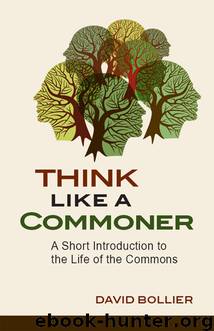Think Like a Commoner by David Bollier

Author:David Bollier [Bollier, David]
Language: eng
Format: epub
ISBN: 9781550925593
Publisher: New Society Publishers
Published: 2014-01-17T05:00:00+00:00
The Inalienable Rights of Commoners
Property rights do not arise naturally, as the great Digger leader Gerrard Winstanley noted in 1659. They are the result of conquest: “For the power of enclosing land and owning property was brought into the creation by your ancestors by the sword.” A Goethe poem, “Catechism,” makes this clear in a conversation between a teacher and a child. “Bethink, thee, child! Where do those gifts come from? Something from yourself alone cannot come.” The child replies that they came from Papa, and that Papa got them from Grandpapa. But where did Grandpapa get them, the teacher asks. Child: “He took them all.” The simple appropriation of things — perhaps with sophisticated legal doctrines to serve as justifications — is arguably the real origin of many property rights.
To be sure, sometimes people affirmatively choose private property regimes without a full understanding of the larger social ramifications. For example, a generation ago, many native peoples in the state of Alaska embraced the idea of administering their traditional lands and resources through “native corporations” — a shift that led to mismanagement of the resources, corruption, inequality and, in some cases, outright dispossession, as outside investors bought up lands now treated as commodities, not sacred inheritances. Similarly, the estate of Dr. Martin Luther King, Jr., run by his children, has treated his writings, images and audio recordings as commercial properties to be sold to the highest bidders, ostensibly to support the preservation of Dr. King’s legacy. The King estate has even claimed a copyright in the iconic “I Have a Dream” speech and once licensed its use to a telecom company for a television and print ad campaign.
Private property rights serve all sorts of useful purposes, of course, and over the course of history have served to emancipate people from the tyranny of kings, aristocrats and authoritarians. But it is also true that private property law can be a nasty form of oppression and coercion in its own right. Taken to extremes and applied to the exclusion of other moral, social and ecological concerns, it is a singularly useful tool for achieving enclosures.
Many property theorists note that the actual scope of property rights has changed significantly over the centuries to meet new economic, technological and social circumstances. The rise of railroads and the Internet disrupted settled understandings of the scope of property rights and the duties of owners, for example. Newly built railroads often threw off sparks that started fires on adjacent farmland, raising questions about whether railroads should be held liable for the resulting harm to landowners. (US courts ruled that this was an inescapable price of economic progress.) Similarly, as the Internet and digital technologies have made it easier to copy and share books, film and records, they have triggered major political battles over the proper scope of copyright laws.
As such stories suggest, the modern tendency to assert absolute individual property rights is a libertarian fantasy. One person’s property rights invariably end up affecting another person’s property rights; everyone’s freedom cannot be limitless.
Download
This site does not store any files on its server. We only index and link to content provided by other sites. Please contact the content providers to delete copyright contents if any and email us, we'll remove relevant links or contents immediately.
The remains of the day by Kazuo Ishiguro(8998)
Tools of Titans by Timothy Ferriss(8393)
Giovanni's Room by James Baldwin(7346)
The Black Swan by Nassim Nicholas Taleb(7129)
Inner Engineering: A Yogi's Guide to Joy by Sadhguru(6793)
The Way of Zen by Alan W. Watts(6614)
The Power of Now: A Guide to Spiritual Enlightenment by Eckhart Tolle(5781)
Asking the Right Questions: A Guide to Critical Thinking by M. Neil Browne & Stuart M. Keeley(5775)
The Six Wives Of Henry VIII (WOMEN IN HISTORY) by Fraser Antonia(5515)
Astrophysics for People in a Hurry by Neil DeGrasse Tyson(5189)
Housekeeping by Marilynne Robinson(4446)
12 Rules for Life by Jordan B. Peterson(4304)
Ikigai by Héctor García & Francesc Miralles(4274)
Double Down (Diary of a Wimpy Kid Book 11) by Jeff Kinney(4268)
The Ethical Slut by Janet W. Hardy(4251)
Skin in the Game by Nassim Nicholas Taleb(4248)
The Art of Happiness by The Dalai Lama(4130)
Skin in the Game: Hidden Asymmetries in Daily Life by Nassim Nicholas Taleb(4006)
Walking by Henry David Thoreau(3962)
